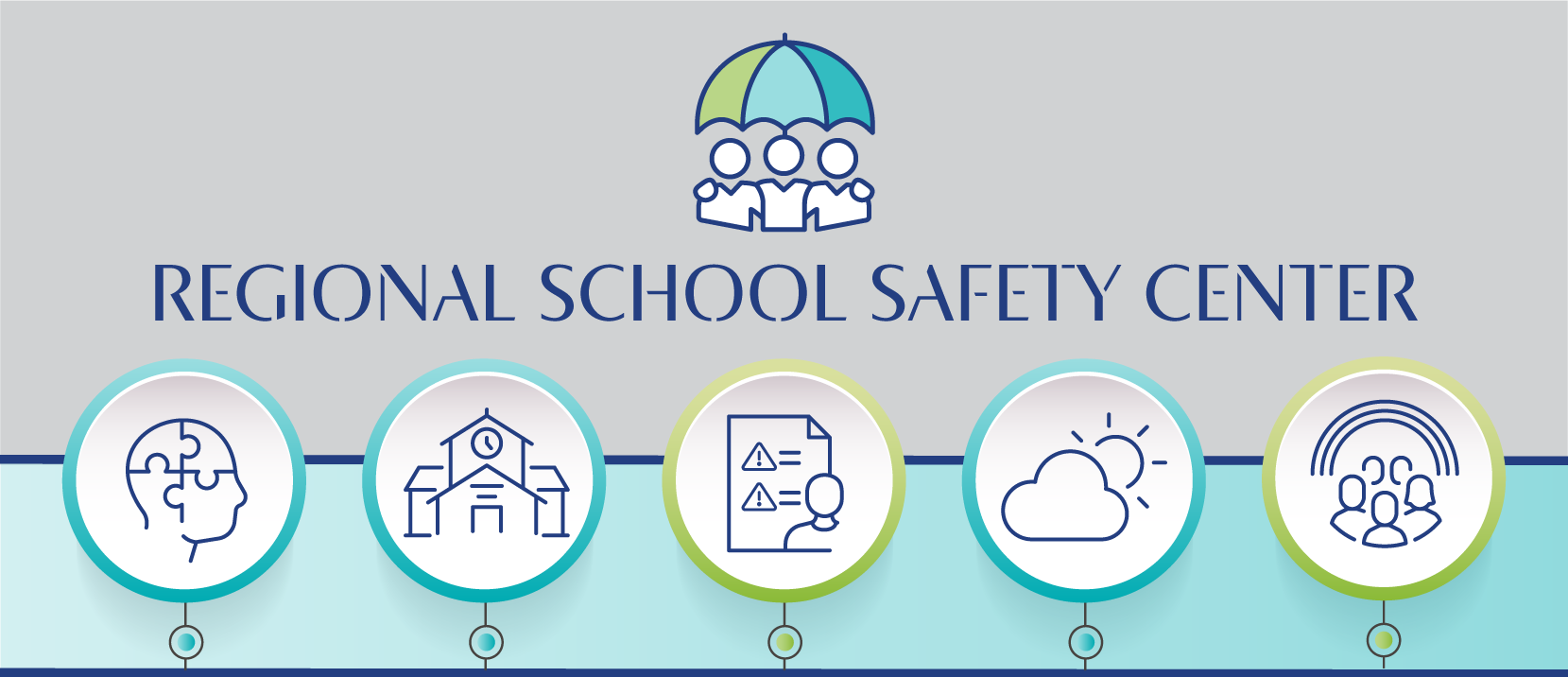|
|

|
Your one-stop solution for all school safety needs.
WINTER NEWS 2025
|
|
|
|
|
|
|
|
Susan Peng-Cowan | Behavioral Health Navigator
|
|
|
|
|
Corina McEntire | Comprehensive School Safety-Public Health Coordinator
|
|
|
|
Don Lawry | Threat Assessment Coordinator
|
|
|
|
Travis Effinger | Threat Assessment Coordinator
|
|
|
|
|
|
Looking for training opportunities? Search pdEnroller for Regional School Safety Center Events
|
In-person and online training options are available now.
|
|
|
|
|
|
|
|
IMMIGRATION RESOURCES
|

|
Many districts have inquired about resources for schools on protections for immigrant students. In response, the Regional School Safety Center Team is sharing this list of guidance and resources to help schools navigate policies and local conversations. This is not an exhaustive list. Please reach out to us if you cannot find what you are looking for.
|
|
|
|
|
|
SCHOOL SAFETY & PUBLIC HEALTH
|

|
Get Ready for the Spring Tabletop Challenge!
|
An important component of a quality safe school plan (or EOP) is outlining a schedule for conducting drills and exercises. In fact, RCW 28A.320.125 encourages schools to conduct regular tabletops and exercises. Why? Because practice is a key component of emergency preparedness.
|
Join schools across our region and enter a drawing for a *free* emergency kit:
|
|
|
|
|
|
Available in March!
|
An Exercise Toolkit with scenarios developed specifically for Standard Response Protocol
|
|
|
|
|
|
Spotlight on After Action Reviews
High-quality school emergency planning includes an After-Action Review (AAR) debrief to evaluate exercises, drills, events, and incidents. An AAR report provides documentation of strengths and identifies areas for improvement. Its purpose is to summarize key information, identify gaps, and articulate lessons learned.
|
Learn more with these resources:
|
|
|
|
|
|
|
|
|
|
Wondering when respiratory illness season will end?
Track the latest virus trends:
|
|
|
|
|
|
Radon Testing
On average, one in five U.S. schools has at least one room with a radon concentration that exceeds the recommended action level (Radon in Schools | US EPA).
|
|
|
|
|
|
Standard Response Protocol Regional Hub
You joined the regional adoption of Standard Response Protocol – how is it going? Check your progress and reach out for help.
|
SRP Mid-Year Checklist for implementation:
|
- Trained all school staff on SRP
- Trained all students on SRP
- Communicated with families about SRP
- Updated the school safety plan to include all 5 emergency actions
- Reached out to local emergency partner agencies
- Conducted drills for each of the 5 emergency actions (by the end of the school year)
|
|
|
|
|
Standard Reunification Method
The SRM outlines a clear process for how to successfully conduct reunification with students and families after an evacuation. Work is underway across our region to adopt a standard process in partnership with emergency response agencies. Join the movement!
|
|
|
|
|
|
BEHAVIORAL HEALTH NAVIGATOR
|

|
Learn more about our Behavioral Health Navigator services on our website.
|
|
|
|
|
SMART trainings
- School Mobilization Assistance Response Teams (SMART) is available in all of our districts in our region. SMART responds to schools during a traumatic event that emotionally impacts students and staff. In addition to crisis management services, SMART provides comprehensive training to help prepare your school and staff in the event of a crisis of any magnitude.
- SMART initial and leads training were held in September and November. Another SMART initial training will be held on February 28 in-person at ESD112—register here
- SMART updates will be held quarterly for those who have been trained in the past. One final update for the year will be held on May 2, 2025, in person at ESD112. Registration for the no-cost May update can be found here.
|
|
|
|
|
Community Partners
UW Forefront Suicide Prevention is hosting a free training with Dr. Jason Kilmer about the overlap of substance use and mental health on February 27 from 12-1. Staff can register here.
|
Parenting coaching—free opportunity: Parenting coaching sessions are now available for free through Beech Acres Parent Connext. SWWA families (or school staff on their behalf) can fill out a referral form through our Youth Navigator Program and state that they would like parent coaching. The sessions are 1:1, free, and last for approximately six sessions over a six-week period.
|
|
|
|
|
|
BHN Consultation re: RCW 28A.320.127:
Development of comprehensive suicide prevention and behavioral health supports for students. Susan Peng-Cowan, your regional Behavioral Health Navigator, is available to assist districts with creating district plans. RCW 28A.320.127 requires all K-12 school districts to adopt a plan to screen, recognize, and respond to indicators of Social Emotional Behavioral Mental Health (SEBMH).
|
At a minimum, the plan must address:
|
- Identification of training opportunities for recognizing, screening, and referring students
- How to utilize district staff trained in recognition, screening, and referral processes
- Guidelines for staff on responding to suspicions, concerns, or warning signs of emotional or behavioral distress in students
- Identification and development of partnerships with community-based organizations (CBOs) and agencies for student referrals, including establishing at least one memorandum of understanding (MOU) with a CBO
Susan has collaborated with numerous districts to create these plans or formalize existing procedures into a cohesive strategy. I invite you to schedule a time to discuss developing your district’s SEMBH plan and address any questions you may have. You can use the link below to book an appointment: Behavioral Health Navigator 112 bookings
|
|
|
|
|
|
QPR Training for ESAs
|
Suicide prevention trainings offered regionally:
|
|
|
|
|
|
District-curated Trainings
|
For district-specific training, contact Behavioral Health Navigator Susan Peng-Cowan to discuss your district’s needs. The most requested topics include Mental Health Literacy, Suicide Prevention, and MH curriculum training. Customized Mental Health training courses can also be developed.
|
|
|
|
|
|
Ongoing and self-paced trainings
Asynchronous trainings on school mental health and related topics are available at healtheknowledge.org, a resource connected to the Mental Health Transfer Center.
|
- Cultivating compassionate school communities that respond to trauma effectively
- Building capacity of school personnel to promote positive mental health in children and youth (self-paced)
- Classroom WISE: Well-being information and strategies for educators
|
|
|
|
|
STUDENT THREAT ASSESSMENT
|

|
Upcoming Threat Assessment Training
Register now: 4/25/25 from 8:30-11:30am at the ESD 112 conference center. All administrators, principals, and school counselors are encouraged to attend, and any interested school staff are welcome too! Three CEUs are offered. You can find the trainings at RSSC - PD Enroller. If you would like to schedule a threat assessment training for your district, or even just your building, please contact us. We would love to do that for you! Best practice means at least one member of staff in each building is trained in threat assessment.
|
The ESD 112 Threat Assessment webpage, has been updated! Come check out new resources that have been added to include safe firearm storage, bullying prevention, targeted violence warning signs, and the National Institute of Justice school shooting facts sheet.
|
|
If you have a situation in which you are uncertain if a threat assessment is indicated, or you just want to talk through a concern you’re having with a student, we are happy to help!
|
|
|
|
HearMeWA.org
HearMeWA, is the new Washington state reporting system exclusively focused on the safety and well-being of young people. This system is committed to being antiracist, trauma-informed, and youth-centered in the services offered. Youth and youth-serving organizations are at the center of this program and help inform the work that is done. Trained crisis counselors field all calls. HearMeWA is a reporting system that helps youth experiencing mental health concerns, bullying, addiction, violent threats, neglect, physical or sexual abuse—or anything that makes life hard—HearMeWA can help. HearMeWA provides secure, free support any time from professionals who are ready to listen.
|
|
For young people who are struggling, every concern deserves attention. HearMeWA provides support to any youth that is going through a tough time or is concerned about another youth’s behavior. If you have a concern, HearMeWA wants to hear about it and offer support. HearMeWA makes it easy to connect youth to a wide range of existing support services by offering a direct line to a national crisis center 24 hours a day, 365 days a year. Reports can be made by phone, text, online, or in the HearMeWA mobile apps available in the Apple or Google stores. Once a report is filed, highly trained crisis counselors triage it and connect the person with service providers who can help. Similar reporting systems elsewhere around the country rely solely on schools to respond. HearMeWA is the first-ever program to expand this type of service statewide, offering alternatives beyond schools or 911. This is especially critical in rural communities, where emergency services are often the first and only resource for youth in crisis. In short, HearMeWA helps young people find help when they are not sure where to turn, no matter where they live.
|
|
|
|
|
|
|
|